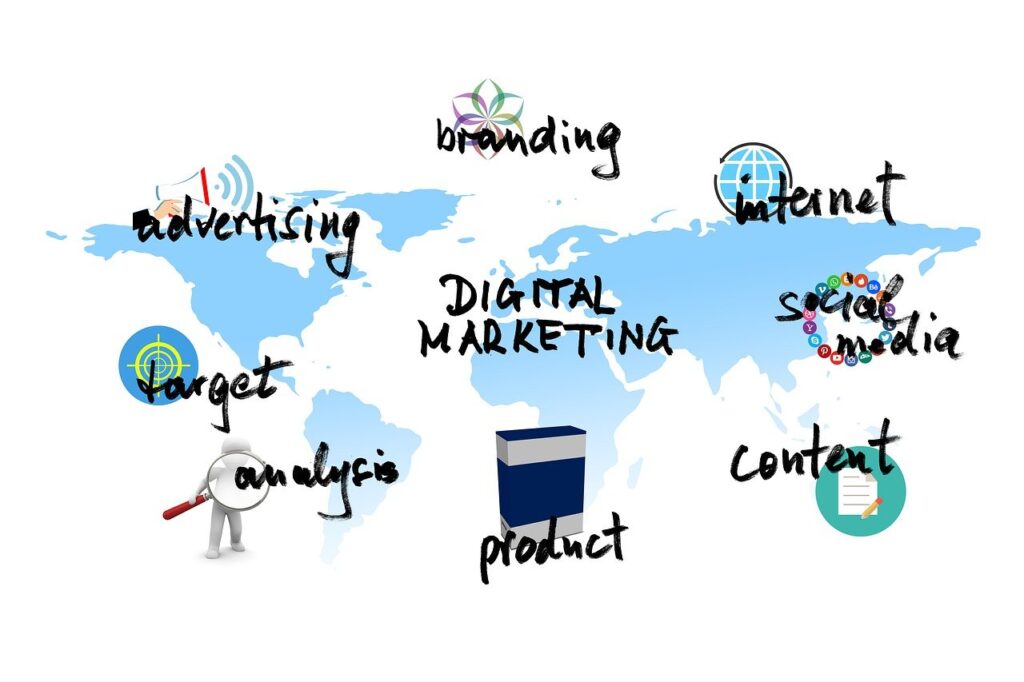In today’s fast-paced digital world, businesses of all sizes are investing heavily in their online presence. As a result, the demand for skilled digital marketers has skyrocketed. If you’re wondering how to start a career in digital marketing, you’re not alone. Many individuals are seeking ways to break into this exciting and ever-evolving industry. Whether you’re a recent graduate, a professional looking for a career switch, or someone with a passion for digital trends, this guide will help you navigate the path to becoming a successful digital marketer.
What is Digital Marketing?
Digital marketing involves promoting products or services through digital platforms such as search engines, social media, email, websites, and mobile apps.
It covers various disciplines, including:
- Search Engine Optimization (SEO): Improves website visibility by optimizing content to rank higher in search engine results.
- Pay-Per-Click Advertising (PPC): An online advertising method where advertisers are charged a fee every time a user clicks on their ad.
- Social Media Marketing: Uses platforms like Facebook, Instagram, and LinkedIn to build brand awareness and engage audiences.
- Content Marketing: Focuses on creating valuable, relevant content to attract and retain a target audience.
- Email Marketing: Sends targeted messages to a list of subscribers to nurture leads and drive conversions.
- Affiliate Marketing: Partners with individuals or companies who promote your products for a commission on each sale.
- Influencer Marketing: Collaborates with influencers who have large followings to promote products or services.
- Mobile Marketing: Reaches users through SMS, apps, and mobile-optimized websites for personalized interaction.
- Analytics and Data Reporting: Measures and analyzes campaign performance to make data-driven marketing decisions.
Understanding these components is essential as they form the backbone of any digital marketing strategy.
Why Choose a Career in Digital Marketing?
- High Demand: Businesses need digital marketers to stay competitive in the online marketplace.
- Diverse Career Options: From content creation to data analysis, digital marketing offers roles for all skill sets.
- Flexible Work Environment: Many digital marketers work remotely or as freelancers.
- Growth Opportunities: With new technologies and platforms emerging, there’s always something new to learn.
- Creative and Analytical Balance: This field allows you to tap into both your creativity and analytical thinking.
Step-by-Step Guide on How to Start a Career in Digital Marketing

1. Understand the Basics
Before diving into digital marketing, familiarize yourself with the basic concepts. You can explore free online resources, watch YouTube tutorials, or read blogs and eBooks. Focus on understanding how digital marketing works and how businesses use it to generate leads, sales, and brand awareness.
2. Choose Your Area of Interest
Digital marketing is vast, so it’s important to identify which areas align with your skills and interests. For instance:
- If you have a passion for writing, content marketing or SEO could be ideal paths to explore within digital marketing.
- If you like data and analysis, analytics or PPC may be a good fit.
- If you’re creative and social, explore social media or influencer marketing.
If you’re still in school or just completed your 12th grade and are unsure where to begin, check out our post on How to Choose a Career After 12th Based on Your Strengths to align your interests and skills with the right career path.
3. Enroll in a Digital Marketing Course
While you can learn a lot on your own, enrolling in a structured digital marketing course will give you a comprehensive understanding of the field. Look for reputable platforms like:
- Google Digital Garage
- HubSpot Academy
- Coursera
- Udemy
- LinkedIn Learning
These platforms offer certificates that can enhance your resume and credibility.
4. Start a Blog or Website
One of the best ways to practice your digital marketing skills is to start your own blog or website. This gives you hands-on experience with SEO, content creation, analytics, and more. Choose a niche you’re passionate about and apply your learning in real time.
5. Gain Practical Experience
Experience is crucial in digital marketing. Consider:
- Freelancing on platforms like Upwork or Fiverr
- Interning with a digital marketing agency
- Volunteering to manage social media for a local business
These experiences allow you to strengthen your portfolio and showcase your abilities to future employers in a practical, results-driven way.
6. Get Certified
Certifications can set you apart from other candidates. Popular certifications include:
- Google Ads Certification
- HubSpot Content Marketing Certification
- Facebook Blueprint Certification
- SEMrush SEO Toolkit Course
These not only improve your knowledge but also add credibility to your resume.
7. Build a Strong Online Presence
Create and maintain a professional LinkedIn profile, join relevant groups, and share insightful content. Demonstrate your knowledge and build valuable connections with other professionals in the digital marketing industry.
8. Create a Portfolio
Your digital marketing portfolio should include:
- Campaigns you’ve worked on
- Analytics reports
- Blog posts
- Case studies
- Certifications
Having a well-organized portfolio demonstrates your experience and results.
9. Apply for Jobs or Start Freelancing
Once you have the necessary skills and some practical experience, start applying for entry-level digital marketing jobs such as:
- Digital Marketing Assistant
- Social Media Coordinator
- SEO Specialist
- Content Writer
Alternatively, you can pursue a path as a freelance digital marketer or launch your own digital marketing agency to serve clients independently.
Essential Skills for a Digital Marketer
To succeed in digital marketing, you should develop the following skills:
- Analytical Thinking
Ability to interpret data and user behavior to optimize strategies and drive better marketing results through informed decision-making. - Creativity
Essential for crafting engaging content, unique campaigns, and out-of-the-box marketing strategies that capture and hold attention. - Communication Skills
Effective verbal and written communication is vital for team collaboration, pitching ideas, and connecting with audiences clearly and persuasively. - Basic Graphic Design
Helps in creating eye-catching visuals for social media, ads, and content, especially using tools like Canva or Adobe Spark. - Writing and Editing
Strong writing skills are needed for blogs, ads, and emails, while editing ensures clarity, correctness, and tone consistency. - Project Management
Enables digital marketers to plan, execute, and track marketing campaigns efficiently, ensuring deadlines and goals are met smoothly. - SEO Knowledge
Understanding SEO improves website visibility on search engines, bringing organic traffic and enhancing content strategy and user engagement. - Data Interpretation
Translating analytics into actionable insights helps refine marketing tactics, measure campaign success, and enhance audience targeting. - Familiarity with Tools like Google Analytics, SEMrush, Canva, and Hootsuite
Proficiency with these tools boosts efficiency in monitoring performance, scheduling content, researching keywords, and designing marketing materials.
Common Career Paths in Digital Marketing
Once you’ve established your foundation, you can specialize in various roles, including:
- SEO Specialist: Optimizes websites to boost their search engine rankings and attract more organic traffic from relevant search queries.
- Content Marketer: Creates valuable content to attract and engage audiences.
- Social Media Manager: Manages brand presence on platforms like Instagram, Facebook, and LinkedIn.
- PPC Specialist: Manages paid advertising campaigns.
- Email Marketing Manager: Develops email campaigns to nurture leads.
- Digital Marketing Manager: Leads and coordinates all aspects of a company’s digital marketing efforts, from planning to execution and performance analysis.
Final Thoughts
Starting a career in digital marketing offers a dynamic and fulfilling journey filled with opportunities to grow, innovate, and make a real impact in the digital space. With the right mindset, dedication, and continuous learning, you can build a successful career in this dynamic industry. By following this comprehensive guide on how to start a career in digital marketing, you’re well on your way to making your mark in the digital world.
Stay curious, stay updated, and never stop experimenting. The digital marketing landscape is full of opportunities—all you need is the initiative to get started.
Disclaimer: The career tips and resources shared in this article are for general educational purposes. They do not guarantee employment or income. Actual career outcomes depend on individual skills, effort, and market conditions.
FAQs: How to Start a Career in Digital Marketing
No, a degree is not mandatory to begin a career in digital marketing. What matters more is your practical knowledge, skills, and hands-on experience. Certifications and real-world projects often carry more weight than formal education in this field.
It typically takes 3 to 6 months to learn the basics of digital marketing through dedicated study and practice. However, gaining real-world experience and building expertise may take 1 to 2 years depending on your learning pace and opportunities.
Absolutely. Digital marketing stands as one of the fastest-growing industries, with rising demand across various sectors and business types. As more businesses go online, the need for skilled digital marketers will continue to rise, making it a future-proof career choice.



